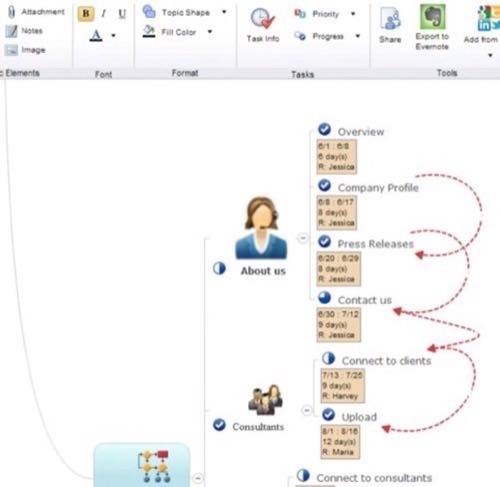Companies everywhere pay for Microsoft’s collaboration and document management service SharePoint, but research and anecdote both indicate that a lot of people dislike using it. What if using SharePoint was fun, though? Imagine all the money invested that would feel more worthwhile and all the collaborative work that could be done.

That’s the theory behind a new product announced tonight from Mindjet, a nearly two decade old company that is best known for its mind mapping software but is extending itself into a larger corporate collaboration market. The company’s new product, Mindjet SP, is a Mindjet plug-in for SharePoint – it takes SharePoint document trees and collaboration and displays them in mind map format. As mind maps go, Mindjet looks good (the company’s free iPad app is a joy to use) – but not everyone loves mind maps in general. Can Mindjet save your company’s SharePoint investment?

Mind mapping is an interesting practice. It’s a method of using visual representations of interconnected concepts to explore non-linear relationships between things. It can be great for helping you think of details in a big complicated situation that you might not have thought of, or been able to write down the context for effectively, in a linear list.
Mind mapping is very popular in Japan, where systems thinking and design are given great respect. The paradigm is also often appreciated by fans of Neuro-linguistic programming, another controversial but also widely appreciated movement.
There’s something that can feel a little hokey about mind mapping too, though. On the most benign end of the spectrum, it can be hard to remember to do. I know I like it when I remember to do it but only sit down and think things out that way a handful of times each year. On the other end of the spectrum, it can sometimes feel like mind mapping is a cult. Sometimes when you really like your mind map hammer, everything in life can look like a mind map nail.
Complicating the situation is the connection between mind mapping, and Mindjet in particular, and a man named Tony Buzan. Buzan claims to have created mind mapping and is a very charismatic figure. He’s got his own mind mapping app and is a frequent lecturer and author. Mind mapping is cool and I do believe that it could be useful in helping expand and strengthen the brain, but there’s something about this man that makes me more sympathetic to his critics than I feel towards him. Mind mapping is cool but Tony Buzan seems at high risk of being obnoxious. Maybe it’s his absolute statements more than anything else. He does tell a good story, though. Here’s Buzan’s explanation of mind mapping, wrapped in an infomercial.
Mindjet’s interface looks a lot like Buzan’s and the company makes mention of him occasionally in passing around its website. It would be nice, I think, if Mindjet’s organic interface view was more loosey-goosey like Buzan’s.
None the less, Mindjet has almost 2 million users of its software. There is a free version, but paid versions have ranged from $20 per month up to $160 per month for up to ten users. It’s a strong business and recently acquired collaberation management web app Cohuman, a startup with a beautiful interface that companies willing to use the public cloud can use in conjunction with Mindjet mind maps. Those two technologies will be much closer integrated in the near future, the company said last week.
Most companies will still prefer to store and share their documents and other files on the private cloud behind firewalls. While critics of Microsoft are abundant, Mindjet believes that Microsoft is going to be a very important part of the enterprise for a long time. The mind mapping and collaboration company believes there’s plenty of opportunity to focus on helping companies get the most out of Microsoft software.
Mindjet SP is an intriguing offering – can traditional or inhospitable interfaces be made more lovable through interpretation into a mind map format? Mind mapping always seems like an idea with great potential. Maybe a use case like this is what will make it finally catch on.

















